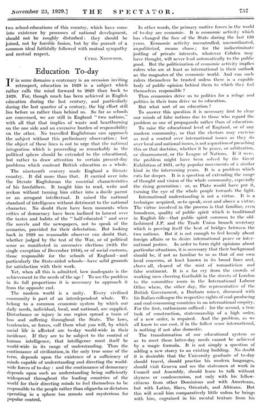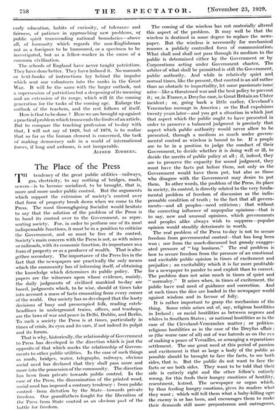Education To - day I F in some domains a centenary is an
occasion inviting retrospect, education in 1929 is a subject which rather calls the mind forward to 2029 than back to 1829. For, though much has been achieved in English education during the last century, and particularly during the last quarter of a century, the big effort still lies before us rather than behind us. So far as schools are concerned, we are still in England " two nations," with all that that implies of waste and heartburning on the one side and an excessive burden of responsibility on the other. No travelled Englishman can approach the subject without this preliminary observation ; but the object of these lines is not to urge that the national integration which is proceeding so remarkably in the political sphere should be extended to the educational, but rather to draw attention to certain present-day problems which confront British education as a whole.
The nineteenth century made England a literate country. It did more than that. It carried over into the literate Englishman the essential characteristics of his forefathers. It taught him to read, write and reckon without turning him either into a docile parrot or an arrogant intellectual. It raised the national standard of intelligence without detriment to the national character. No doubt there have been moments when critics of democracy have been inclined to lament over the tastes and habits of the " half-educated " and over the novels and the newspapers, not to speak of the scenarios, provided for their delectation. But looking back in 1929 no reasonable observer can doubt that, whether judged by the test of the War, or of political sense as manifested in successive elections (with the single exception of December 1918), or of social customs, those responsible for the schools of England—and particularly the State-aided schools—have solid grounds for satisfaction with their work.
Yet, when all this is admitted, how inadequate is the achievement to the needs of the age ! To see the problem in its full proportions it is necessary to approach it from the opposite end.
The modern world is a unity. Every civilized community is part of an interdependent whole. We belong to a common economic system by which our daily needs, individual, local, and national, are supplied. Disturbance or injury in one region spread a train of loss and suffering throughout the State. The laws, tendencies, or forces, call them what you will, by which social life is affected are to-day world-wide in their incidence. If they are to be subject to the control of human intelligence, that intelligence must itself be world-wide in its range of understanding. Thus the continuance of civilization, in the only true sense of the term, depends upon the existence of a sufficiency of minds capable of understanding and directing the world- wide forces of to-day : and the continuance of democracy depends upon such an understanding being sufficiently widespread throughout the leading countries of the world for their directing minds to feel themselves to be responsible to the people rather than oligarchs or dictators operating in a sphere too remote and mysterious for popular control, In other words, the primary motive forces in the world of to-day are economic. It is economic activity which has changed the face of the State during the last 150 years. Economic activity uncontrolled, uncoordinated, unpoliticized, means chaos ; for the indiscriminate jostling of private interests, whatever Cobden may have thought, will never lead automatically to the public good. But the politicization of economic activity implies rulers who are at least as international in their outlook as the magnates of the economic world. And can such rulers themselves be trusted unless there is a capable body of public opinion behind them to which they feel themselves responsible ?
Thus economics drive us to politics for a refuge and politics in their turn drive us to education.
But what sort of an education ?
To answer this question it is necessary first to clear our minds of false notions due to those who regard the problem as one of propaganda rather than of education.
To raise the educational level of England, or of any modern community, so that the electors may exercise as real a control over international issues as they do over local and national issues, is not a question of preaching this or that doctrine, whether it be peace, or arbitration, or disarmament, or the League of Nations, If it were, the problem might have been solved by the Great Exhibition of 1851, or by popular movements of a similar kind in the intervening years. It is a problem which cuts far deeper. It is a question of extending the range of thought and vision of the whole community, especially the rising generation : or, as Plato would have put it, turning the eye of the whole people towards the light. International understanding is not a virtue. It is a technique acquired, so to speak, over and above a virtue.
The virtue involved in the process is that familiar, even humdrum, quality of public spirit which is traditional in English life—that public spirit common to the old- fashioned J.P. and the Trade Union branch secretary which is proving itself the best of bridges between the two nations. But it is not enough to feel keenly about foreign affairs or to desire international peace or inter- national justice. In order to form right opinions about particular situations, it is necessary that their background should be, if not as familiar to us as that of our own local concerns, at least known in its broad lines and, above all, cleared of the mist of romanticism and false sentiment. It is a far cry from the crowds of working men cheering Garibaldi in the streets of London to the committee room in the International Labour Office where, the other day, the representative of the British Government, a Durham miner, discussed with his Italian colleague the respective rights of coal-producing and coal-consuming countries in an international enquiry.
For the first, enthusiasm sufficed : for the second, a true task of construction, statesmanship of a high order, of a new order, is required. And the problem, as we all know to our cost, if in the fullest sense international, is nothing if not also domestic.
The transformation of our educational system so as to meet these latter-day needs cannot be achieved by a magic formula. It is not simply a question of adding a new storey to an existing building. No doubt it is desirable that the University graduate of to-day should travel, should practise his modern languages, should visit- Geneva and see the statesmen at work in Council and Assembly, should learn to talk without shyness or condescension, not only with his fellow- citizens from other Dominions and with Americans, but with Latins, Slays, Orientals, and Africans. But this will avail him comparatively little unless he brings with him, engrained in his mental texture from his early education, habits of curiosity, of tolerance and fairness, of patience in approaching new problems, of public spirit transcending national boundaries—above all, of humanity which regards the non-Englishman not as a foreigner to be humoured, or a specimen to be investigated, but as a fellow-worker in the cause of a common civilization.
The schools of England have never taught patriotism. They have done better. They have imbued it. No manuals or text-books of instructions lay behind the impulse which sent our volunteers into the ranks in the Great War. It will be the same with the larger outlook, not a supersession of patriotism but a deepening of its meaning and an extension of its range, which will fit the coming generation for the tasks of the coming age. Enlarge the outlook of the teachers, and the rest follows of itself. How is that to be done ? Here we are brought up against a practical problem which transcends the limits of an article.
But to compare the teaching profession of to-day with that, I will not say of 1829, but of 1879, is to realize that so far as the human element is concerned, the task of making democracy safe in a world of international forces, if long and arduous, is not insuperable.
ALFRED ZIMMERN.































































 Previous page
Previous page